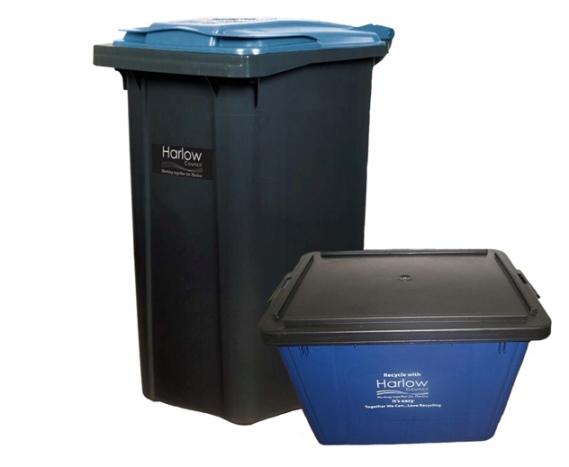 You should recycle as much as you possibly can.
You should recycle as much as you possibly can.
We provide wheelie bins or blue boxes for you to recycle your waste. We collect these every 2 weeks.
You need to make sure the items are empty, clean and dry. Squash plastic bottles and flatten cardboard to maximise space in your container.
We recommend you put your waste loose into your recycling and non-recycling bins, rather than in bags, as you will fit more in and use less plastic bags.
We will collect extra recycling if your bin or boxes are full. You need to put this in clear or white bags only - do not use any other colour bags as we will not collect these. Put the bags next to your full bin or box.
We can collect:
- mixed paper – newspapers, magazines, paperback books, leaflets, brochures, greeting cards (no glitter), wrapping paper (no glitter or foil-like wrapping)
- cardboard – egg boxes, toilet and kitchen rolls
- aerosols – deodorant, cleaning products, hair products
- foil – food containers, take away trays
- metal cans – drink cans, food cans, biscuit tins
- plastics – types 1 and 2, you can find the number in the recycle triangle
- mixed glass - bottles and jars
We cannot collect:
- anything in bags that are not clear or white
- black or purple bags
- ceramics, crockery, window glass, drinking glasses or Pyrex
- clothes, shoes and fabric items - use our textile waste collection
- electrical items - use our bulky waste collection
- food waste - use your food caddy
- food packaging with any remaining food or liquid - makes the material unsuitable for recycling and can contaminate other recyclables
- green waste - use our green waste collection
- light bulbs - take these to Harlow Recycling Centre (the dump)
- nappies, incontinence and sanitary waste - put these in your non-recycling or use our nappies and incontinence waste collection
- polystyrene
- plastics not marked with 1 or 2 symbols - like yoghurt pots, tubs, children's toys, plastic bags and film wrapping
- cartons - juice or soup
- wallpaper
- wood
Unfortunately, any black plastic items with the number 1 or 2 symbols currently cannot be recycled.
Collected recycling is taken to a Materials Recycling Facility (MRF) where items such as paper, plastic bottles, glass bottles and jars, cardboard, tins and cans are separated and then turned into new products.